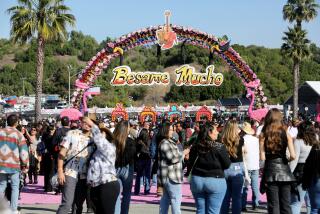Bewitching brew from Ojos de Brujo
- Share via
Members of Ojos de Brujo, the brilliant Barcelona band that performed Friday at California Plaza, privately worried before the show about the outdoor venue used for free summer concerts in the heart of downtown Los Angeles.
The ponds at the Watercourt looked like a musical moat, separating the Spanish band from its fans. And those sleek downtown office towers housing global banks and high-powered accounting firms suggested the audience might be too upscale for the band’s grass-roots, socially committed, flamenco-inspired music.
By the third song, “Sultanes de Merkaillo,” those worries had vanished.
With the irresistible sway of the rumba catalana, a Spanish cousin of Afro-Cuban rhythms, this eclectic collective had proved it could connect with people across any divide -- geographic, cultural or physical.
Judging by the exuberant reception from the multi-ethnic audience, the band has managed to surmount another big pond over the last few years -- the Atlantic Ocean.
After winning accolades across Europe, the group, whose name means Eyes of the Wizard, appears closer to gaining the wider recognition it richly deserves on these shores.
When I first saw Ojos de Brujo live four years ago in Spain, the group was also performing outdoors near a body of water -- at an amphitheater in the ancient walled city of Cartagena overlooking the Mediterranean. There, at a nexus of Western, African and Middle Eastern civilizations, the cultural forces inspiring Ojos de Brujo seemed to blow in the wind.
Unlike lesser bands that create clunky fusions with all the components showing, Ojos de Brujo cooks up an organic blend from disparate elements -- edgy scratching, syncopated hand-clapping, polyrhythmic Afro-Cuban and Middle Eastern percussion, scintillating acoustic guitar and hypnotic echoes of India, the original homeland of the Gypsies. The whole -- which it dubs jip-jop flamenkillo -- is truly greater than the sum of its parts.
The difference is that these skilled musicians don’t just borrow from global musical currents. The currents run through them.
Still, band members had one more thing to worry about -- they feared a break between sets might interrupt their momentum. They prefer to play straight through, building spontaneous steam to a rousing finish.
However, the intermission turned out to be productive. It was used for a quickie rehearsal with local trumpeter Luis Eric Gonzalez, who valiantly filled in at the last minute for the band’s regular horn player, a Cuban denied a visa.
Onstage, the substitute did as well as could be expected, considering he stepped blindly into a crackling tight unit with most members together for years. At the core are Ramon Gimenez (guitar), Xavi Turull (percussion), Panko (keyboard, scratching) and Marina “La Canillas” Abad, the charismatic, Gypsy-robed central figure whose sharp-tongued, poetic and compassionate songwriting gives Ojos de Brujo its essential mystique.
The band’s most outstanding new addition is flamenco dancer Sonia Poveda, sister of young flamenco singer Miguel Poveda, who dazzled the crowd with her astonishing footwork. Along with flamenco guitarist Paco Lomena, she brings a stamp of authenticity to a band that has been criticized by flamenco purists for ripping off their traditions.
Neither the intermission nor early technical problems deprived the show of its highenergy moments, including a blistering bass solo by Javi Martin, tongue-twisting beat box scatting by Maxwell Wright and Turull’s thrilling percussion solo.
At a time when everything is up for sale, it’s gratifying to see this band reach artistic heights by staying true to its ideals. Ojos refuses corporate sponsorships, owns its own label and plans its own tours -- at a financial loss when it visits the U.S.
The band’s reward is winning new fans just as it has since its inception in Barcelona -- on the streets and in person. Throughout the show, fans mobbed the table selling the band’s superb albums “Bari” and “Techari,” its latest work with a title that captures its creative spirit.
In Gypsy slang, techari means “free.”


